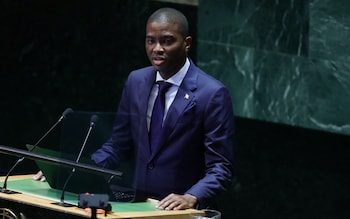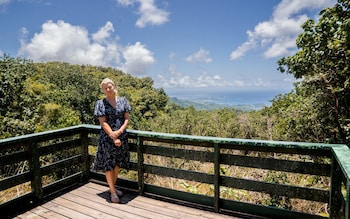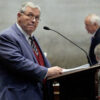Grenada has demanded that the Bank of England pay slavery reparations for its ownership of plantations.
The government of the Caribbean nation has delivered a letter to Andrew Bailey, the Bank’s governor, calling on the institution to atone for its “enslavement of Africans”.
Grenada’s cabinet has insisted that the Bank of England begin negotiating reparations for its involvement in the “atrocious” slave trade.
The Bank owned two plantations and almost 600 slaves on the island in the 18th century.
The appeal to the Bank comes as former Caribbean colonies aim to pivot to seeking reparations from institutions involved in slavery, rather than the UK Government, which has refused to make payments.
A letter received by Mr Bailey and seen by The Telegraph states: “The Government of Grenada calls upon the Bank of England to make Reparations to Grenada on account of the direct involvement of the Bank of England in the 1780s in the enslavement of Africans and their descendants in Grenada.”
‘Immeasurable suffering’
It continues, stating that “the enslavement of Africans in Caribbean colonies including Grenada was atrocious”, adding: “The work regime, punishments inflicted both physically and psychologically, and the immeasurable suffering endured have multiplier effects on our current populations of African descent.”
Arley Gill, a lawyer who heads Grenada’s National Reparations Commission, a body which steers policy on seeking reparatory justice for the slave trade, said: “The Bank of England have done all the research, they have had an exhibition demonstrating to the world their involvement and profiteering from the crime against humanity that is slavery. We urge them to do the proper thing and to have a discussion with us on how they they can repair the harm they caused
“They have financed the slave trade and slavery in many instances, in this case they owned slaves and plantations and were directly involved. They can only do the right thing now by committing to making repairs to the harm which was caused.
“We look forward to the Bank’s substantive response to our proposal.”
Grenada was a British colony from 1763 until independence in 1974, and in recent years its dedicated National Reparations Commission has become an advocate for Britain to atone for the exploitation of slave labour on the island.

Grenada’s government, under Dickon Mitchell, the prime minister, has asked the Bank of England for reparations
Credit: LEONARDO MUNOZ/AFP/Getty Images
Grenada’s current government, under the leadership of Dickon Mitchell, as prime minister, has requested that the Bank of England make reparations, and enter talks over the nature and scale of this compensation.
No figure has been given for the sum Grenada may seek from the Bank.
The reparations demanded will be in line with those set out in the Caricom (Caribbean Community) 10 Point Plan for Reparatory Justice, which range from formal apologies, to financial payments, the provision of education programmes, and debt cancellation.
The government has requested that the Bank send representatives to meet with Grenadian delegates to form a joint committee, which will outline a reparations package by the end of August.
Grenada’s government claims that not only was the Bank involved in financing slave-trading activities in general, but also that it had specific interests on the island.
In the 1780s, the Bank loaned money to slave owners with interests in the Chemin and Bancolet plantations in Grenada.
They defaulted on their payments, and their shares in the plantations and the attached slaves passed to the Bank of England, which then bought up further shares and took overall control of the properties, and 600 slaves.
The Bank has apologised for its Caribbean dealings, which were reflected in a recent exhibition in its London museum space titled Slavery & the Bank.
The formal demand that the Bank of England address its profiteering from slavery has been received by officials at the institution, but it is understood that they must now consult with the UK Foreign, Commonwealth & Development Office before responding.
Grenada has been at the forefront of efforts to secure reparations for the 15 member states of Caricom, which functions in a similar manner to the European Union.




Laura Trevelyan offered £100,000 to atone for her ancestors’ ownership of slaves in Grenada
Credit: Damian C Jacob
Laura Trevelyan, the former BBC presenter, aided the cause by offering £100,000 of her own money to atone for her ancestors’ ownership of slaves on the island.
Grenada has seized on this model of individual reparations to seek payments from institutions once involved in slavery, who may have leeway to offer negotiations, rather than governments that have refused to bow to Caribbean demands.
The Bank was approached for comment.


